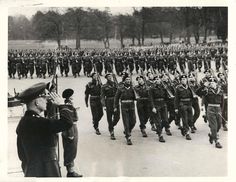If you don’t want to know anything else other than listen to the speech, click https://www.youtube.com/watch?v=wjx3IqURT6I. If you’d like to take a couple of minutes and, I think, gain more out of it, read below–you’ll see another link and can view the speech then. (Whichever you do, thanks for pursuing. All the best, Dan)
This is the story. I want you as a leader to absorb it, work through it, and learn from it. Let me know if you want to talk about it with me (free of charge, simply call or text 317-407-3687 and we’ll arrange a brief chat—again, free of charge—I do a lot of things just because the Spirit moves me, and this is a good example of that).
Let’s get to it.
General Dwight Eisenhower received a last-minute request to say a few words to the young men graduating from the Royal Military Academy at Sandhurst. They were entering various ranks as officers, having completed the training curriculum and exercises at this institution. Eisenhower’s remarks were to be rather brief, as anyone would reasonably expect at a graduation ceremony.
It is March 11, 1944, on the weekend, a Saturday to be specific. Eisenhower comes to the microphone in the midst of planning Overlord, the operation that will involve an invasion of German-held France by Allied forces in World War II. The operation will be unprecendented in scale, size, and span. None like it before. As he looks out over the group of graduates, Eisenhower has been immersed in planning for roughly 75 days. The expected date of execution—the day of invasion—is assumed to be approximately 60 days away, though no one can say with total certainty. That’s the hope: 60 days from now.
Here is my leadership exercise for you before you watch this brief speech. As you answer the questions below,
- How do you prepare?
- What do you really want your audience to remember from you? What’s the one point you hope they’ll be talking about after you’re done?
- Is this an important moment for you as a leader or it is simply completing a task?
Click https://www.youtube.com/watch?v=wjx3IqURT6I for the speech.
One last thing. I’ve done this for clients and I’ve got to tell you this is a powerful point. All of us now—in 2017—like to run around jabbering about “transformation.” That’s fine, a good and rightful thing. However, I want to point out that the story of Overlord 1944-1945 is a shocking, dramatic, and gripping account of transformation in a totally different way. The Allied force that planned, executed, and followed-up Overlord was entirely “as-is”. I’m saying that they had to act in a transformative way—eat, sleep, breathe, and frankly, bleed transformation without anything close to our assumptions and expectations about the preparation needed to do it. They did it “as-is”, as they were, with all the flaws, limitations, and hindrances they already had. They didn’t suddenly become perfect or even best. They did it as-is.
Maybe you should think about that as a leader next time you tackle trasformation. Learn from the greatness that was the “as-is” transformation of 1944-1945. I’m happy to talk with you about how that might happen. Once again, all the best, Dan








